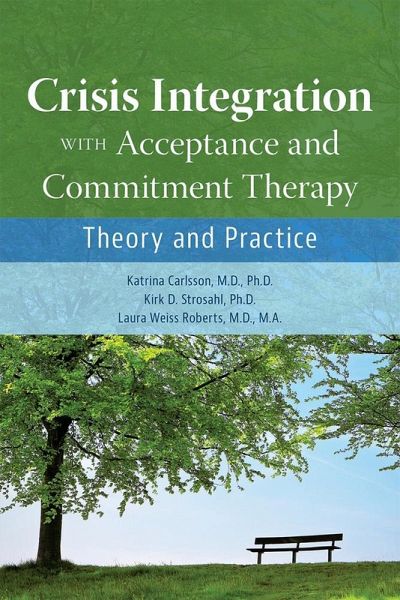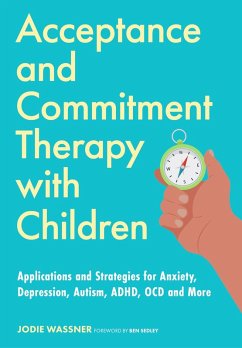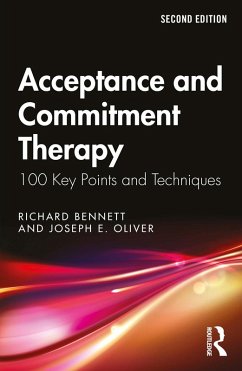
Crisis Integration With Acceptance and Commitment Therapy (eBook, ePUB)
Theory and Practice
Versandkostenfrei!
Sofort per Download lieferbar
37,95 €
inkl. MwSt.
Weitere Ausgaben:

PAYBACK Punkte
19 °P sammeln!
Frightening and destabilizing as they may be, personal crises can also provide meaningful opportunities for learning and growth. For individuals struggling with mental disorders, however, mitigating the former and fostering the latter can be challenging, particularly in the context of what are often time-limited conversations or a limited number of visits.In Crisis Integration With Acceptance and Commitment Therapy: Theory and Practice, health care professionals will find a practical guide, informed by both theory and evidence, to the psychological skills patients need to deal with and grow th...
Frightening and destabilizing as they may be, personal crises can also provide meaningful opportunities for learning and growth. For individuals struggling with mental disorders, however, mitigating the former and fostering the latter can be challenging, particularly in the context of what are often time-limited conversations or a limited number of visits.
In Crisis Integration With Acceptance and Commitment Therapy: Theory and Practice, health care professionals will find a practical guide, informed by both theory and evidence, to the psychological skills patients need to deal with and grow through crises.
Enlivened by detailed and engaging clinical dialogues-all based on real-world clinical practice-this book introduces the acceptance and commitment therapy (ACT) model, demonstrating how it applies to findings from crisis studies and can be integrated into clinical practice. It then delves into the three core processes of ACT:
. Mindfulness, as understood in terms of predictive coding as well as non-systematic interoceptive exposure, and its effectiveness in both acute and chronic crises. Self-compassion and how the action of bringing affection and kindness to oneself during intense torment can be crucial to acceptance. Engagement with life and the importance of controlling one's own behavior in the midst of otherwise uncontrollable crisis-provoking events
Although crises come in a variety of forms, Crisis Integration With Acceptance and Commitment Therapy: Theory and Practice argues that the core processes that underpin the generation and maintenance of a crisis response are essentially the same and helps to simplify the conceptualization of complex clinical presentations.
By accessibly and deftly melding crisis science, evolutionary psychology, neuroscience, behavioral psychology, and the practice of mindfulness, this volume offers readers-be they psychiatrists, psychiatric residents, psychologists, psychotherapists, or other health care professionals-an approach that is easy to learn, simple to remember, and applicable to any crisis situation that their patients may be confronting.
In Crisis Integration With Acceptance and Commitment Therapy: Theory and Practice, health care professionals will find a practical guide, informed by both theory and evidence, to the psychological skills patients need to deal with and grow through crises.
Enlivened by detailed and engaging clinical dialogues-all based on real-world clinical practice-this book introduces the acceptance and commitment therapy (ACT) model, demonstrating how it applies to findings from crisis studies and can be integrated into clinical practice. It then delves into the three core processes of ACT:
. Mindfulness, as understood in terms of predictive coding as well as non-systematic interoceptive exposure, and its effectiveness in both acute and chronic crises. Self-compassion and how the action of bringing affection and kindness to oneself during intense torment can be crucial to acceptance. Engagement with life and the importance of controlling one's own behavior in the midst of otherwise uncontrollable crisis-provoking events
Although crises come in a variety of forms, Crisis Integration With Acceptance and Commitment Therapy: Theory and Practice argues that the core processes that underpin the generation and maintenance of a crisis response are essentially the same and helps to simplify the conceptualization of complex clinical presentations.
By accessibly and deftly melding crisis science, evolutionary psychology, neuroscience, behavioral psychology, and the practice of mindfulness, this volume offers readers-be they psychiatrists, psychiatric residents, psychologists, psychotherapists, or other health care professionals-an approach that is easy to learn, simple to remember, and applicable to any crisis situation that their patients may be confronting.
Dieser Download kann aus rechtlichen Gründen nur mit Rechnungsadresse in A, D ausgeliefert werden.













